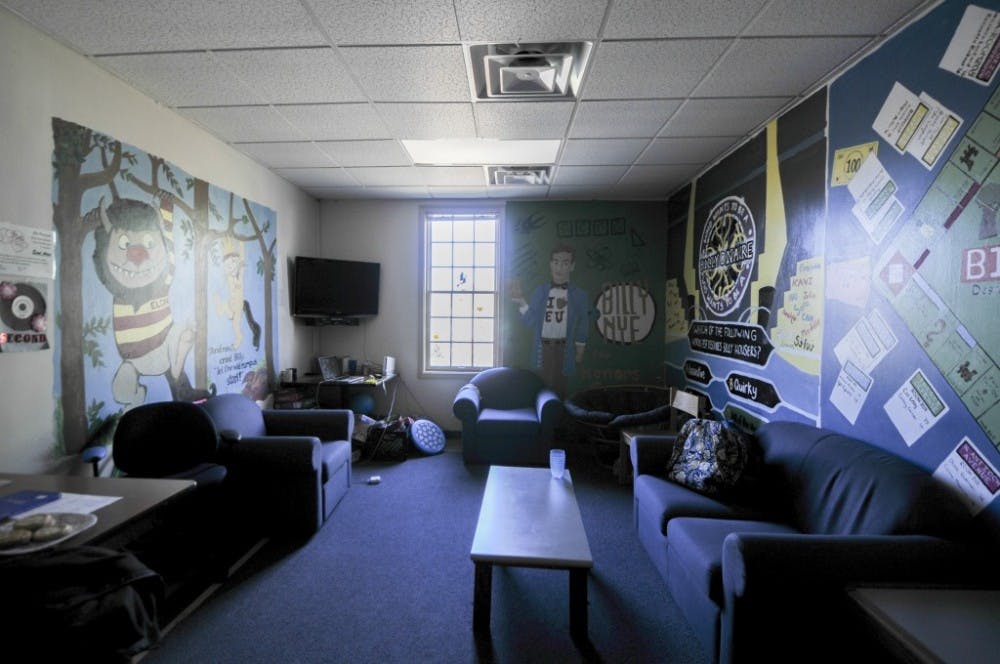One of the biggest changes Elon University is striving to make in the upcoming years is the push toward fusing the residential experience and the academic experience. One way the university is working towards this goal is through living learning communities (LLCs).
Currently, 420 students live in defined learning communities. The LLC program is expanding, according to Laura Arroyo, associate director of residence life for residential education.
Arroyo said there will be 22 LLCs next year, and most communities will be expanding to include more members.
Typically LLCs have been a popular choice for first-year students trying to find their niches on campus, but Arroyo said Elon is trying to get more upperclassmen to live in them.
“We had a number of upperclassman apply this year because we’ve really revamped our program,” Arroyo said. “I think that upperclassmen have found that they fit in there too.”
Freshman Riley Billman currently lives in the Communications Learning Community. She will be living there again next year as the resident assistant.
“I really love living on this floor, and I wouldn’t want to live anywhere else next year,” Billman said. “I have an idea of starting a mentor program on the hall. There will be several sophomores, and I think it could be really helpful for the freshmen.”
Learning communities exist to help students both academically and socially.
Junior Maggie Macdonald lived in the International Learning Community for two years. She originally decided to live there to have something in common with the people she lived with.
“In a learning community, ideally, [academics and sociality] are mixed in a way so that you don’t know you’re learning,” Macdonald said. “There were social aspects because we hung out a lot, but we were always talking about each other’s cultures and learning about different cultures. That’s something you don’t always get on campus.”
Ryan Sienerth, a sophomore living in the Science, Technology and Mathematics (STEM) Learning Community, said he sees his hall mates helping each another with schoolwork since they are in many of the same classes.
“I often see groups of my hall mates attempting to work through physics or chemistry problems together,” he said. “The learning community generally makes the resource of others in your subject readily available.”
Billman also said she sees members of her community working together.
“I’ve helped people make videos and be in projects, and it’s nice to know that there are a bunch of people right here that are willing to help me as well if I need it,” she said. “And then its really great knowing that my best friends are all right down the hall, so I can always find someone to get breakfast with.”
Each learning community has a faculty adviser who helps plan events for the hall and be a stabilizing force in the community. Several professors live in the learning community with their students.
“It made me so much more confident and comfortable around my professors, living down the hall from one,” Macdonald said. “If you get an adviser who is passionate and willing to put in a lot of time, it’s really beneficial to everyone.”
Seinerth’s advisor, Tony Crider, does not live on the hall with the students, but still plays an active role in the community.
“Crider is an excellent fit for the hall,” Sienerth said. “He’s concerned with issues on the hall just like we are.”
The faculty adviser receives a stipend to plan activities such as bringing in speakers and going on excursions to foster group bonding and introduce students to new experiences.
Despite the benefits some students receive from LLCs, not everyone has found their niche in them.
Sophomore Joey Louis lives in the Arts and Letters learning community.
“I like living where I am, but I can’t say that being in a learning community has really helped me in any way,” Louis said. “I don’t know about other learning communities, but we haven’t really done much together as a community.
Freshman Dawson Nance considered living in a learning community but ultimately decided not to apply.
“I’m really happy with where I am now,” Nance said. “I’ve met a great group of people on my hall, and I know a lot of people who have transferred out of their learning communities because they didn’t fit in. I definitely don’t regret not living in one.”
LLCs are a large part of the Elon residential community and as Elon expands and changes, learning communities will change as well.
“LLCs are constantly evolving, and what works this year might not work next year,” Arroyo said. “They are a student-run thing, and it’s all about what students need at this time in their life.”


